Freedom
Global Affairs and Human Development
•
8m 15s
Brazil’s African slave descendants, the Quilombola, have fought a long and hard struggle for recognition. After the abolition of the slave trade they were left abandoned and ostracised, devoid of rights and outside of Brazilian mainstream society. But things are slowly changing amongst rural communities.
In the 1988 constitution Brazil’s Quilombola were granted access to land rights and since then they have been actively building a way to secure land titles on the sites where many have lived for generations. Community mapping is an important tool in this process, as is increasing awareness amongst the Brazilian population through education and ecotourism.
‘Freedom’ looks at two Quilombola communities, one with no land title and one benefitting from legal recognition, and examines the disparities between them.
Director: Paul Redman
Producer: Tim Lewis
2015 | 8 min
Latin America | Brazil
Languages: Portuguese
Subtitles: Portuguese, English, Indonesian, Spanish
Up Next in Global Affairs and Human Development
-
Fortune's Gift: Said Hussein
Fortune's Gift is an interactive web documentary. It captures 14 positive stories of refugees and ordinary Danish citizens who seek to strengthen our common humanity. In the wake of the refugee crisis that has swept across Europe, and the negative sentiments expressed through our politics and med...
-
Fortune's Gift: Faiza Bajalan
Fortune's Gift is an interactive web documentary. It captures 14 positive stories of refugees and ordinary Danish citizens who seek to strengthen our common humanity. In the wake of the refugee crisis that has swept across Europe, and the negative sentiments expressed through our politics and med...
-
Forced: Child Labour and Exploitation...
[Trigger Warning] FORCED sets out to capture the complexity and prolific occurrence of child labour and exploitation in Bangladesh. This film takes you into the streets of Dhaka, where children form part of the visual landscape: an integrated part of the work force, they work because society acce...



